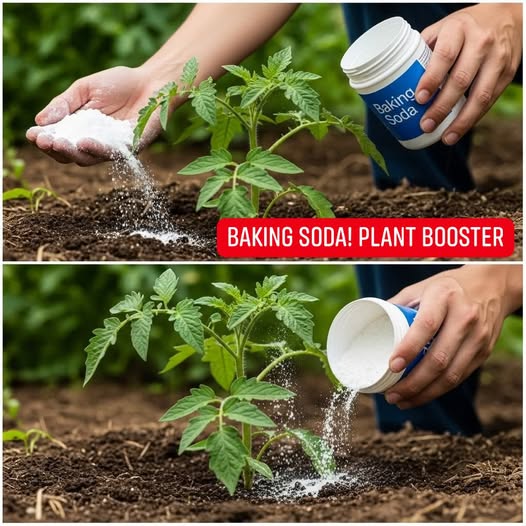Simple test:
Take a soil sample and place a few spoonfuls in a container.
Add half a cup of vinegar—if it fizzes, your soil is alkaline.
In a second container, add water to the soil, then mix in a spoonful of baking soda. If it fizzes, your soil is likely acidic.
This is not a precise method but gives a general idea of soil characteristics before you consider more detailed testing.
8. General Garden Freshening
Baking soda can also help reduce moldy or musty smells in shaded or damp areas of your garden.
Mix baking soda with water and spray on garden surfaces (not plants) where odors linger.
Use dry baking soda to lightly deodorize garden shoes, gloves, or storage bins.
Tips for Safe Use
Always test a small section of a plant before widespread spraying.
Avoid overuse—while baking soda is natural, excessive amounts can disrupt soil chemistry.
Use only diluted solutions when applying directly to plants.
Store unused solutions in a cool, dry place and remake weekly for freshness.
Final Thoughts
Baking soda is a powerful, budget-friendly addition to your garden toolkit. From controlling fungi and pests to cleaning tools and adjusting soil conditions, this simple ingredient offers a wide range of natural gardening solutions. When used correctly and in moderation, it can support a healthier, more balanced garden environment—without the need for synthetic chemicals.
Simple test:
Take a soil sample and place a few spoonfuls in a container.
Add half a cup of vinegar—if it fizzes, your soil is alkaline.
In a second container, add water to the soil, then mix in a spoonful of baking soda. If it fizzes, your soil is likely acidic.
This is not a precise method but gives a general idea of soil characteristics before you consider more detailed testing.
8. General Garden Freshening
Baking soda can also help reduce moldy or musty smells in shaded or damp areas of your garden.
Mix baking soda with water and spray on garden surfaces (not plants) where odors linger.
Use dry baking soda to lightly deodorize garden shoes, gloves, or storage bins.
Tips for Safe Use
Always test a small section of a plant before widespread spraying.
Avoid overuse—while baking soda is natural, excessive amounts can disrupt soil chemistry.
Use only diluted solutions when applying directly to plants.
Store unused solutions in a cool, dry place and remake weekly for freshness.
Final Thoughts
Baking soda is a powerful, budget-friendly addition to your garden toolkit. From controlling fungi and pests to cleaning tools and adjusting soil conditions, this simple ingredient offers a wide range of natural gardening solutions. When used correctly and in moderation, it can support a healthier, more balanced garden environment—without the need for synthetic chemicals.

